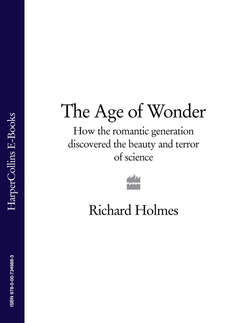Читать книгу The Age of Wonder: How the Romantic Generation Discovered the Beauty and Terror of Science - Richard Holmes - Страница 15
6
ОглавлениеAfter a stay of three months, the British expedition prepared to leave in the second week of July 1769. Banks spent a whole day sowing South American fruit seeds for the Tahitians to harvest after they were gone: lemons, limes, watermelons, oranges. While he loaded his final specimens of Tahitian plants and animals aboard, he considered the possibility of taking a human representative of Paradise back to England. The matter had been raised with Tupia, the wise priest, who proposed that he himself should make the perilous journey together with his young son: ‘This morn Tupia came on board, he had renewed his resolves of going with us to England, a circumstance which gives me much satisfaction. He is certainly a most proper man, well born, chief Tahowa or priest of this Island, consequently skilld in the mysteries of their religion. But what makes him more than any thing else desireable is his experience in the navigation of these people and knowledge of the Islands in these seas. He has told us the names of above 70, the most of which he has himself been at.’53
Although Tupia was evidently enthusiastic to make the journey, Captain Cook would not underwrite the decision. He did not feel that the Tahitian could be signed on as an official member of the expedition, and he thought that once he was in England the Admiralty and the Crown would ‘in all human probability’ refuse to support him financially. Banks had no such hesitations, and resolved to be responsible for both Tupia’s welfare and his upkeep, saying he was taking on Tupia as his friend and his guest. Cook agreed, and would find Tupia’s help as the expedition’s South Seas navigator and Polynesian translator invaluable.
Banks added a comment that seems extraordinarily revealing. He suddenly thinks of outdoing his fashionable country-house friends back in Yorkshire with their exotic pets. ‘I do not know why I may not keep [Tupia] as a curiosity, as well as some of my neighbours do lions and tygers, at a larger expence than he will probably ever put me to.’ The idea that his friend and adviser could have been considered, even for a moment, as a ‘curiosity’, or a wild animal specimen, comes as a shock. It shows that Banks, for all his sympathy and humanity, could easily revert to his role as Linnaean collector and wealthy European landowner on a jaunt among the natives. However one explains it, the remark hangs uneasily in the air, never quite dissipated, never quite forgotten: the snake in the garden.
Nonetheless, Banks closed this entry on a more typically generous note: ‘The amusement I shall have in [Tupia’s] future conversation, and the benefit he will be of to this ship, as well as what he may be if another should be sent into these seas, will I think fully repay me.’54
There was a last-minute drama when, as Fort Venus was being dismantled, two of the marines slipped away into the woods, having said they had beautiful Tahitian wives, were content to resign His Majesty’s service, and intended to stay. Cook sent out a tracking party, but also took native hostages, which caused a good deal of ill-feeling. Once again it was Banks who defused a potentially ugly situation, by agreeing to spend the last night onshore with his Tahitian friends, until the marines should return. ‘At day break a large number of people gatherd about the fort many of them with weapons; we were intirely without defences so I made the best I could of it by going out among them. They wer[e] very civil and shewd much fear as they have done of me upon all occasions, probably because I never shewd the least of them, but have upon all our quarrels gone immediately into the thickest of them. They told me that our people would soon return.’
The marines did return, to everyone’s huge relief, at eight o’clock that morning, and Banks watched carefully through his telescope as they were hauled aboard the Endeavour while the hostages were released in exchange. Once he saw they were all ‘safe and sound’ he discharged his own Tahitian ‘prisoners’ from his tent, ‘making each such a present as we though[t] would please them with which some were well content’.55 Though he does not mention it, this may also have been his last chance to spend a night with Otheothea.
The Endeavour finally hoisted anchor early on the morning of 13 July 1769. ‘After a stay of 3 months we left our beloved Islanders with much regret,’ reported Banks, with careful understatement.56 The whole of Matavi Bay was full of Tahitian canoes. Oborea and Otheothea came aboard briefly to say tearful farewells. Banks and Tupia then climbed the rigging and stood together in the crow’s nest, waving. Sydney Parkinson wrote: ‘On our leaving the shore the people in the canoes set up their woeful cry-Awai! Awai!-and the young women wept very much. Some of the canoes came up to the side of the ship, while she was under sail, and brought us many cocoas.’57
